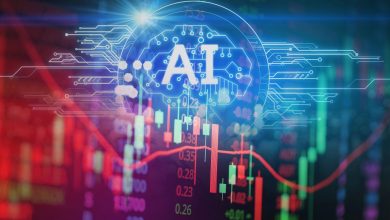
Discover how artificial intelligence (AI) is transforming stock trading. As an investor, you might wonder how AI enhances your trading strategies and navigates the complexities of the financial markets.
This post explores eight key advantages of AI in stock trading and its potential to revolutionize your investing approach.
Enhanced Prediction Accuracy and Speed
AI analyzes vast data at incredible speeds, surpassing human capabilities. This enables AI algorithms to identify patterns and make accurate predictions about future stock movements.
Analyzing Vast Amounts of Data
One of the most significant advantages of AI in stock trading is its ability to process and interpret market trends, historical data, and real-time information far more efficiently than human traders.
Identifying Patterns and Making Accurate Predictions
By leveraging machine learning techniques, AI can spot hidden patterns and correlations in the data, allowing it to make precise predictions about future stock performance. This enhanced accuracy and speed can give you a competitive edge in the market, enabling you to make informed decisions quickly.
Advanced Risk Management Capabilities
AI excels in the crucial area of stock trading risk management. By analyzing vast historical data and market trends, AI algorithms identify potential risks and anomalies that may elude human traders. AI stock trading continuously monitors market conditions and detects any deviations from normal patterns.
Identifying Potential Risks and Anomalies
AI continuously monitors market conditions, detecting deviations from normal patterns. This proactive approach to risk identification helps you stay ahead of potential threats and make informed decisions to protect your investments.
Scenario Analysis and Risk Mitigation
AI systems can perform scenario analysis, simulating various market conditions to assess the potential impact on your portfolio. By evaluating multiple scenarios, AI empowers you to develop robust risk mitigation strategies and make well-informed decisions.
Cost Efficiency through Automation
AI-powered trading systems can automate many routine tasks, reducing the need for manual intervention. This automation saves time, minimizes operational costs, and reduces the risk of human error.
Automating Routine Tasks
By leveraging AI, you can automate data analysis, trade execution, and other repetitive tasks. This frees up your time and resources, allowing you to focus on strategic decision-making and other high-value activities.
Focusing on Strategic Decision-Making
With AI handling the routine tasks, you can dedicate more energy to developing and refining your overall trading strategy. This shift towards strategic thinking can lead to significant financial benefits in the long run, both for individual traders and institutions.
Backtesting and Strategy Optimization
Backtesting is the process of testing a trading strategy against historical data to evaluate its effectiveness. AI simplifies and accelerates this process, allowing you to simulate numerous trading strategies simultaneously.
Simplifying and Accelerating Backtesting
With AI, you can quickly test and compare the performance of different trading strategies across various market conditions. This rapid backtesting capability saves you time and effort, enabling you to identify the most profitable and risk-adjusted approaches.
Refining Trading Strategies
AI can help you optimize your trading strategies by analyzing the results of backtesting and identifying areas for improvement. By continuously refining your strategies based on AI-driven insights, you can adapt to changing market dynamics and maximize your potential returns.
Real-Time Market Sentiment Analysis
AI has the ability to analyze real-time data from various sources, including news articles, social media feeds, and market indicators. By processing this vast amount of unstructured data, AI can gauge market sentiment and provide valuable insights into the prevailing market conditions.
Analyzing Unstructured Data
AI algorithms can process and interpret unstructured data, such as news articles and social media posts, to extract meaningful insights. This capability allows AI to capture the overall market sentiment and identify potential trends or shifts in investor behavior.
Staying Ahead of the Curve
By leveraging real-time sentiment analysis, you can stay ahead of the curve and adjust your trading strategies accordingly. AI can alert you to potential opportunities or risks based on sudden changes in market sentiment, enabling you to make timely decisions and capitalize on market movements.
Personalization of Trading Strategies
Every investor has unique goals, risk tolerances, and investment preferences. AI can help personalize trading strategies to align with your individual needs, ensuring that your trading approach is tailored to your specific circumstances.
Tailoring Strategies to Individual Needs
By analyzing your trading history, risk profile, and financial objectives, AI algorithms can generate customized trading recommendations. This personalization takes into account your unique circumstances, maximizing the potential for success.
Continuous Adaptation and Refinement
AI can continuously adapt and refine your trading strategies based on your evolving goals and market conditions. This dynamic approach ensures that your trading strategies remain optimized and aligned with your changing needs over time.
Improving Regulatory Compliance and Monitoring
Regulatory compliance is a critical aspect of stock trading, and AI can play a significant role in ensuring adherence to financial regulations. AI algorithms can monitor trading patterns and detect any irregular activities or potential violations.
Ensuring Adherence to Financial Regulations
By continuously analyzing trading data and comparing it against regulatory guidelines, AI helps maintain compliance and reduces the risk of legal and financial penalties. This proactive approach to compliance monitoring provides peace of mind and protects your investments.
Automating Record-Keeping and Reporting
AI can automate record-keeping and generate reports required by regulatory authorities. This streamlined process saves you time and effort, ensuring that you meet all the necessary compliance requirements without the hassle of manual documentation.
Impact on Market Efficiency
AI contributes to overall market efficiency by ensuring that stock prices reflect all available information. With its ability to process and analyze vast amounts of data in real-time, AI helps eliminate information asymmetries and reduces the potential for market inefficiencies.
Ensuring Accurate Pricing
By rapidly processing and reacting to market changes, AI systems contribute to more accurate pricing. This enhanced efficiency ensures that stock prices reflect the true value of the underlying assets, benefiting all market participants.
Reducing Arbitrage Opportunities
AI’s swift analysis and response to market information help reduce the opportunities for arbitrage. This increased market efficiency creates a more level playing field for individual investors like you, minimizing the impact of market manipulations
| Feature | Traditional Trading | AI-Powered Trading |
| Data Analysis | Manual, time-consuming | Automated, rapid |
| Prediction Accuracy | Limited by human bias and cognitive limitations | Enhanced by machine learning algorithms |
| Risk Management | Reactive, based on human judgment | Proactive, data-driven |
| Strategy Optimization | Limited backtesting capabilities | Extensive backtesting and simulation |
| Market Sentiment Analysis | Delayed, reliant on human interpretation | Real-time, automated |
| Personalization | Generalized strategies | Customized to individual preferences |
| Regulatory Compliance | Manual monitoring and reporting | Automated monitoring and record-keeping |
| Market Efficiency | Prone to information asymmetries | Enhanced by rapid information processing |
The integration of AI in stock trading has revolutionized the way investors approach the financial markets. From enhanced prediction accuracy and cost efficiency to advanced risk management and personalized strategies, AI offers a wide range of advantages.
As an investor, embracing AI-powered trading tools can empower you to make more informed decisions, optimize your strategies, and potentially improve your investment outcomes.
However, it’s essential to remember that AI is a tool to augment human judgment, not replace it entirely. By combining the power of AI with your own knowledge and intuition, you can navigate the complexities of the stock market with greater confidence and success.
Ready to harness the power of AI in your stock trading journey? Start by researching reputable AI-powered trading platforms and tools that align with your investment goals and risk tolerance.
FAQs
- What are the main benefits of using AI in stock trading?
AI enhances trading by providing real-time data analysis and predictive insights, improving accuracy and decision-making speed in stock investments.
- How does AI reduce risks in stock trading?
AI utilizes advanced algorithms to identify patterns and market trends, allowing traders to mitigate risks by making informed, data-driven decisions.
- Can AI in stock trading improve investment returns?
Yes, AI can boost investment returns by optimizing trade timing and selection, leveraging historical data and predictive analytics to capitalize on market opportunities.








